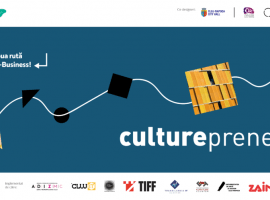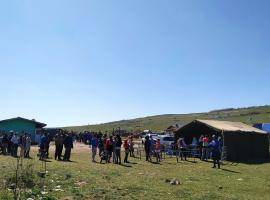Cultural and creative industries are among the ones most hit by the effects of the Covid-19 pandemic. According to the estimation made by Eurostat[1], the COVID-19 crisis may affect about 7.3 million cultural and creative jobs across the EU, representing 3.7% of total employment at EU level. There is no doubt that in an European landscape where the more fragile players, such as young people, self-employed and potential entrepreneurs, are suffering the consequences of the current situation of crisis, the need for education on more sustainable business models in cultural and creative industries is on the rise. This assumption can contribute to explain the high number of applications received after the launch in May 2020 of the call for Culturepreneurs, the entrepreneurial educational program for the cultural and creative sector promoted by Cluj Future of Work.
Culturepreneurs is developed and coordinated by the Cluj Cultural Centre, in continuation with the previous editions of the programme that in the framework of Cluj Future of Work involves a series of partners, each of them responsible for the management of one of the four courses composing Culturepreneurs.
Out of 106 candidatures received in total, 69 applicants were selected to take part to the incubation program, whose activities expected to take place in 2020 were completely redesigned to be carried out online, instead than with traditional onsite classes.
Since March to July 2020, the project partners ARIES Transylvania IT Cluster, Arts and Design University, Cluj IT Cluster, Transylvania Furniture Cluster and Transylvania International Film Festival worked together with the Cluj Cultural Centre, that led the co-design of the entire process, to create the curricula and to decide how to deliver the training activities of the different learning modules. The representatives of these partners were included in the selection committee, which interviewed each candidate in the second half of July 2020 and evaluated them taking into account, among different criteria, the feasibility of the entrepreneurial project in the cultural and creative sector proposed in the application form, the potential impact at urban and community level of the project to be implemented after the Culturepreneurs programme, social competences (curiosity, resilience and communication) and entrepreneurial skills (such as vision and strategic thinking).
More than just focusing on the technical aspects, such as the digital platforms to be used for teaching and ensuring the development of engaging exchange dynamics among the students, the most challenging aspect was the selection of the topics to be included in the curricula. Bearing in mind its potential replicability, the innovative aspect of this process of co-creation involving different partners was to imagine since the beginning how this amount of knowledge can be shared as a common good in different innovation and education ecosystems of the city, in order to spread an entrepreneurial culture in different urban contexts (schools, university faculties, enterprises, clusters and so on) in the years to come.
The first part, dedicated to business essentials, was delivered from September to December 2020 completely online while the beginning of the specialized modules, to be held in class at the Labs installed at CREIC, was postponed to January 2021 in order to better cope with the effects of the Covid-19 situation (which made impossible to carry out laboratorial activities in 2020).
The Business Essentials part was divided into six modules (Managing and Strategy; Marketing and Communication; Finance and Legal; System Thinking and Open Innovation; Digitalisation; Artistic Thinking), reflecting the different backgrounds of the partners involved in the action. The modules combined basic entrepreneurial skills to cutting-edge topics, such as creative and artistic thinking or open innovation. These last contributed to better characterize the learning path towards innovative entrepreneurship in cultural and creative industries.
The structure of the training modules was proposed by the Cluj Cultural Centre and co-designed with project partners in the thematic Steering Committee on Culturepreneurs, conceiving them as an opportunity to make international and local trainers work together, with the objective of preparing an effective transfer of the contents of the curricula to the participants. The international and national experts trained the participants and inspired some of the aspects that emerged from the Business Essentials modules in Masterclass sessions. At the same time, the assistant trainers of the modules worked in small groups or mentored the participants in one-to-one sessions, in order to fine-tune the project ideas and better prepare them for the pitching session, which took place online on 15 December.
51 out of 65 participants in Culturepreneurs applied to present their project ideas during the session, designed to be held exclusively online: each participant had seven minutes to present the defining aspects of the project to be developed and receive questions or recommendations from the jury composed by partners’ representatives, mentors, experts and entrepreneurs of the cultural and creative sector.
In order to receive a prize of 1200 euros, to be invested on marketing and product development, each participant had to fulfil 60% of a series of criteria. Some of them, as active participation in the modules and activities of the program and progress in the incubation period since the launch of the project, were evaluated during the first phase of the programme with trainers’ feedbacks or coaches’ reports. Other criteria (ability to further develop the project; attitude and communication skills; potential impact of the project on the target audience; strategy for launching and developing the project on the market) were judged during the pitching session by the members of the jury.
All the 51 participants who pitched their project ideas received the prize of 1200 euro, having fulfilled 60% of the criteria mentioned above. The diversity and inventiveness of the projects presented in areas such as product design, non-formal education, technology, furniture industry and textile industry, positively surprised the members of the Jury and are promising elements in view of the next pitching sessions, scheduled for May 2021.
Even though the whole process was initially disrupted by the pandemic emergency, the collaborative creation of a blended model combining digital activities and on-class laboratories tested in Cluj-Napoca gives a glimpse into the future of skills development. The engagement of many different local actors in upskilling potential entrepreneurs in cultural and creative sector appears as an interesting action coherent with the aims and the scheme proposed by the Pact for Skills recently launched by the European Commission. Combining all these elements to an integrated use of technologies and the collaboration with international knowledge hubs and resources, Culturepreneurs managed to show its validity already in its first phase, making visible its potential replicability in other cities at EU and global level.
[1]
Montalto, V., Sacco, P.L., Alberti, V., Panella, F. and Saisana, M., European Cultural and Creative Cities in COVID-19 times, EUR 30249 EN, Publications Office of the European Union, Luxembourg, 2020



























